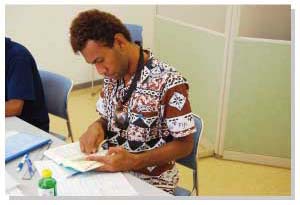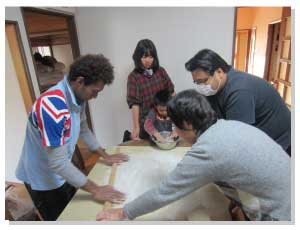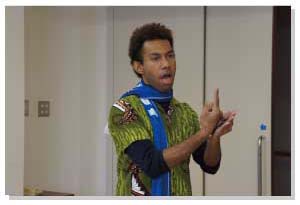- HOME
- Alumni News
- Naqio Etika Lagilagi (Naqio Eve) (13th trainee)
- Etika (Eve)'s Final Report
Etika (Eve)'s Final Report
My Days in Japan
INTRODUCTION
My name is Etika Lagilagi Naqio. I was born and raised in Suva, the capital city of Fiji. I live with my parents. My parents are of a mixed European, Indian and Fijian descent. I have 12 brothers and sisters including half brothers and sisters. I am 24 years old. I have been working at the Fiji People Disabilities Federation and the Fiji Association of the Deaf (FAD) for many years.
Last year, the President of the FAD gave me an opportunity to apply for the Duskin Training Program. I had previously applied for it many times without success. I was about to give up but the president and other people with disabilities encouraged me to try it again for the last time. So I decided to give it a go and filled in the form though the deadline was very close. Later on, I received the surprising news from the Duskin Training Program that I was selected as a trainee.
MY EXPERIENCES IN JAPAN
I am going to talk about how my life progressed in Japan, how I learned the Japanese language and how I ended up in the land of the rising sun after finally starting to live for a passion that I only managed to discover in my twenties.
I am going to share my experiences of the Japanese language and many of the things I did to build my career skills. While being trained in Japan, for the first time in my life, I felt cold, I ate Japanese food, I wrote Japanese and I communicated in Japanese sign language. I felt overwhelmed by the amount of work. Personally I love warm weather and the Fijian environment because I am used to them. Being in Japan, I was very stressed with the report writing task and this made me want to go back to Fiji. I felt to give up on this program but luckily I got a lot of advice from the FAD. My colleagues at the FAD kindly emailed me with encouragements and told me to try my best no matter how big or small my trouble was. So I was thinking about God, that He wants me to serve the people in Fiji. I felt I was one who is very important to the people – especially those with disabilities. I started crying over the email I got from the FAD. Finally I managed to stay positive and continue my studies at JSRPD. I was trying my best to complete my studies even though I was not very good at writing Japanese. I still love Japan no matter how complicated the society is now.

HOME-STAY AND SKIING
1. Home-stay
Mr. and Mrs. Mizonokuchi are from South Miyakonojo-shi, Miyazaki. This was the first time for me to stay with a Japanese family in their traditional home.
They decided to take me to many memorable places and show me what everyday lives looked like in their family during the home-stay. This gave me many great memories that I could share with the people in my beautiful Pacific Islands when I go back there.
Firstly, they followed the plans we had discussed for the home-stay. We had made time to meet the deaf families’ children, and they asked me if there was anything I would like to do. So I told them that I wanted to see some famous places. Fortunately, the home-stay was happening during the festive New Year season, so that worked out perfectly for me.
I was happy that Mr. and Mrs. Mizonokuchi came to the Miyazaki Airport to meet me and Miss. Nasu. Mr. Mizonokuchi was very nice to me and taught me many things. Mrs. Mizonokuchi was always smiling at me and corrected my mistakes in Japanese.
My big thanks go to Mr. and Mrs. Mizonokuchi. I was so blessed to see the beautiful scenery of Miyazaki. I really want to thank Mr. and Mrs. Mizonokuchi, their parents and friends from the bottom of my heart.

2. Skiing Experience
In late January, I went to Echigo Yuzawa in Niigata Prefecture. It was the first time for me to experience skiing on heavy snow and ice, which does not happen in my country. The skiing was one of the most unforgettable memories and happiness I ever had in my life. I thanked my teacher for teaching me how to ski well. It was so fun even though I was very tired from falling all the time. I skied for the whole day with the Duskin training team though it was very cold that day.
INDIVIDUAL TRAINING AND WORKSHOP
From February to May, I went to Osaka for the Medekiku T.V. NGO CS Broadcasting for People with Disabilities. I learned about the media, including sign language news, sign language news anchors, video edition and making subtitles. I also collected valuable information from them.
I was glad to learn more about them. I would like to thank Miss Yanagi and Miss Tahara who helped me improve my knowledge about the media. After visiting the Medekiku T.V., I also visited the Hyogo Deaf Association and met the deaf president, Mr. Shimamoto. He is a strong advocate and active person in Japan. I remembered that I had seen him in the video from the World Federation of the Deaf Youth and others. One of my friends had told me about him.
I attended training places and I did some studies on sign language, people with disabilities, employments centers, old people with disabilities and deaf/blind interpreters in the Hyogo area. I was so thankful to have had Mr. Shimamoto for helping me find a dentist for my dental problem. I was told that I should not eat too many sweets which are damaging to my teeth.
After the individual training, I went back to Tokyo for the Workshop Program. It was an awesome and best workshop I ever attended in my life. I did learn a lot from them about my interest on empowerment, leadership, communication, how to work in a team, proposal writing skill and organizational management. I like the Japanese way of teaching. I hope to apply them in Fiji when running a workshop. All lectures helped me enhance my knowledge. There have been so many improvements I will never forget in Japan.

MY OBJECTIVE IN THE PACIFIC ISLANDS AFTER TRAINING:
1. In Fiji, I will work as a trainer at the Pacific Disability Forum and as a regional ambassador for UNICEF on a voluntary/part-time basis.
2. My goal after this training is to go back to my Deaf community and share with them my experiences and skills I learnt from Japan. I also want to share knowledge about cross-disability organizations in Fiji as the experience is relevant to the UNCRPD and my role as regional ambassador for UNICEF.
As the World Federation of the Deaf has approved of the formation of the Oceania Deaf, I would like to pass on my knowledge to disability communities across the region. I would like to see more Pacific Island countries signing and ratifying the UNCRPD. There were a lot of advocacy work and voluntary work I did during my time with the FAD and also the Fiji Disabled People Federation.
3. I will work at the Pacific Disability Forum and get information and assistances and distribute them out to other deaf people in the Pacific region so that they can set up their own Deaf Associations in their home countries, as well as interpreter associations so that we all as Pacific Islanders will have access to communication in the future. Some deaf people in the Pacific region have their own deaf association or disabled people association, so this could be a way to share information and plans through networking via Facebook, email, and video calling. We can build awareness on deaf culture and how to live in a society as deaf. Enhancing and improving the standard of education and livelihood, not only for deaf communities but also for all People with Disabilities (PWD)’s communities in the Pacific Islands.
CONCLUSION
I would like to thank all the people who have provided me the unforgettable support: at the Duskin AINOWA Foundation, my teachers of the Japanese language, skiing teachers, swimming teachers, individual training lecturers, workshop lecturers, JSRPD staff and last but not least, my 13th Duskin trainee team and also Miss. Nasu for her continuous support in interpreting. I will always respect her. I will never forget my best moments about all of you from the beginning to the end of the program.
This program has given me more confidence and experience even though I had a difficult time adjusting to the Japanese environment. I know that God has finally testified my life in Japan and I am going to do my best to help all People with Disabilities in Fiji.




